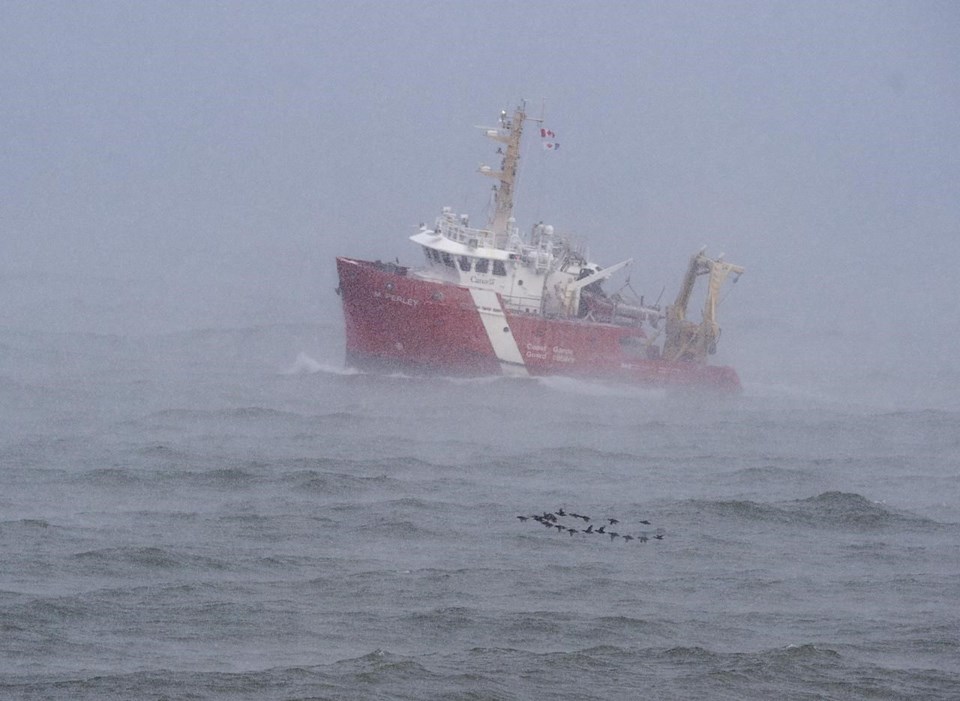HALIFAX — A Transportation Safety Board of Canada report has linked the fatal sinking of a Nova Scotia scallop dragger in 2020 to years of federal inaction on the imposition of stricter stability standards for fishing vessels.
The report released Wednesday says the Chief William Saulis should have been tested for stability, given the fact that major changes had been made to the boat by its owners. They had added a heavy, A-frame structure for scallop dragging, a protective plate to the boat's stern, and covers to close drainage holes.
On Dec. 15, 2020, the modified vessel capsized in the Bay of Fundy during a gale as it returned to its home port in Digby, N.S. All six crew on board died.
The independent agency says Transport Canada inspectors during a 2017 visit didn't tell Yarmouth Sea Products Ltd. that the modifications to the boat were stability "risk factors," which were defined in a federal safety bulletin and questionnaire.
It says these factors "would have required a stability assessment" by a naval architect, who would have produced written guidelines for the crew on how to safely load the vessel.
Transport Canada has told The Canadian Press that federal rules at the time didn't mandate stability assessments after vessels are modified. That rule was brought in three months after the inspection of the Chief William Saulis.
However, the board made clear in its report and during Wednesday's news conference that it has long urged a stricter law on stability assessments and that Transport Canada hasn't complied.
The TSB recommended after the 2015 capsizing of the Caledonian off the west coast of Â鶹´«Ã½Ó³»Island, which resulted in three deaths, that Transport Canada require "all" small fishing vessels to have stability assessments, with the results "readily available to the crew."
Kathy Fox, the chair of the TSB, said during the news conference that with an average of 11 fishers dying every year in Canada, she is still "pressing" for the fulfilment of this recommendation.
"That is the only way the crew on these vessels will know the safe operating limits; otherwise, they go on experience and on feeling and that's proven in the past to be insufficient," she said during the news conference in Halifax.
Crew on the Chief William Saulis followed the industry practice of heavily loading the vessel with catch during its return crossing to the wharf in Digby. Due to the rough weather, the crew had left about half the scallops on the deck with the shells still on, which allowed them to slide about, the report says.
The report says about 2,700 kilograms of scallops were stacked almost two metres high on the boat's deck, which the agency says likely contributed to the boat's instability and potentially blocked its ability to drain water.
The bodies of Eugene (Geno) Michael Francis, Aaron Cogswell, Leonard Gabriel, Dan Forbes and captain Charles Roberts were never recovered after the 17-metre vessel went down off Delaps Cove. The body of crew member Michael Drake was swept up on the rocky shoreline.
Michelle Nickerson-Forbes, the widow of Dan Forbes, said the sinking left their two sons without a father, and she said the lack of regulatory oversight of the industry makes her feel physically ill.
"It makes me sick to my stomach," she said in an interview Tuesday evening. "It makes me sad to know he could still be here. It makes me wonder how and why things slipped through the cracks like they did.
"It scares me because I come from a fishing family so I still have people out on fishing vessels."Â
Federal Transport Minister Omar Alghabra declined a request for an interview. His department sent a written statement Wednesday saying it would "thoroughly review the investigation report and its recommendation" and provide a formal response in 90 days.
Transport Canada had said in a January email that its inspectors weren't "triggered" to have the owners fill out a questionnaire that would have identified the need for a stability test, and that it's up to the owner "to ensure the vessel is operated safely and is loaded and ballasted" in a way that ensures stability.Â
Yarmouth Sea Products, through a lawyer, declined to comment on the matter on Wednesday.
According to the safety board's website, stability has been a factor in the sinking of five vessels since 2007, including the 2020 sinking of the fishing boat Sarah Anne off Newfoundland's south coast, which claimed four lives.
In the report released Wednesday, the board also said that Transport Canada needs to provide to fishing companies clear templates that lay out safety procedures. It recommends that Transport Canada inspectors "verify that each required written safety procedure is available to the crew and that the crew are knowledgeable of these procedures."
In the case of the Chief William Saulis, the report cites the lack of clear procedures for the vessel regarding when to close drainage ports and about how scallops should be stowed on deck — two procedures it said were "elements critical for the stability" of the boat.
During the news conference, Fox said the "ongoing lack of regulatory oversight means that fishing crews are routinely operating on vessels without even knowing how to stay safe or how to respond when things go wrong."
This report by The Canadian Press was first published March 22, 2023.
Michael Tutton, The Canadian Press
Note to readers: This is a corrected story. A previous version said the sinking resulted in five deaths.



